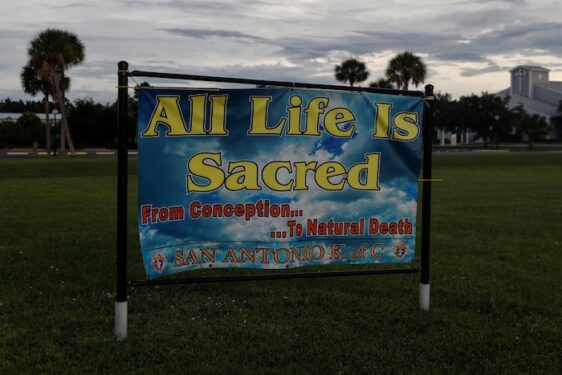By Carol Zimmermann
WASHINGTON (CNS) — In a 78-39 vote, Florida’s House of Representatives Feb. 17 approved a ban on most abortions after 15 weeks of pregnancy.

A companion measure faces a Senate vote the week of Feb. 21 and could be passed by both chambers by the end of the month. Florida Republican Gov. Ron DeSantis has said he supports the legislation and would sign it into law.
But the law could face a state court challenge and ultimately end up before the Florida Supreme Court.
The Florida Conference of Catholic Bishops, the public policy arm of the state’s bishops, has backed the abortion ban bill and urged Catholics in the state to contact their state representatives, and now state senators, to approve it.
Christie Arnold, associate for social concerns and respect life with Florida bishops’ conference, testified before a House subcommittee Jan. 19 in support of the bill. She said the state’s bishops support its increased “protections for women and children, specifically unborn children.”
“It is encouraging that the bill narrows the window of time in which a woman can obtain an abortion to 15 weeks gestation. This is a good step in the right direction to limit the harm of abortion and further protect unborn children,” she said.
The Florida measure includes exceptions for the life of the mother and for “fatal fetal anomalies.”
Current state law bans abortions when a fetus is viable, or able to survive outside the womb, which is typically considered to be 24 weeks. The Florida Catholic conference states on its website that prohibiting abortion after 15 weeks “would align with research demonstrating that unborn children have the capacity to feel pain at that point of development.”
The Florida bill is similar to Mississippi’s abortion law — awaiting a Supreme Court decision in Dobbs v. Jackson Women’s Health Organization — that bans almost all abortions after 15 weeks. Arizona and West Virginia also have similar 15-week abortion bans before their state legislatures.
If the Supreme Court ruling in Dobbs overturns the court’s 1973 Roe v. Wade decision legalizing abortion nationwide, it will leave it to the states to make abortion policies.
“I believe we have a unique opportunity in the fact that the Supreme Court is considering 15 weeks right now,” said Republican state Rep. Erin Grall, who sponsored the bill. She said the measure would allow the state “to save as many babies as possible as soon as possible after that decision is made,” The Washington Post reported.
The newspaper also quoted Democratic state Rep. Anna Eskamani’s final objection to the measure, after six hours of debate on the floor, saying: “We should trust the women of Florida to make this decision. This is not something with which the government should be involved.”
Another Florida bill aims to protect the fetus from tobacco exposure by requiring pregnant women and women who may become pregnant to be educated about the health risks of tobacco. It also requires a review committee to study fetal and infant mortality in Florida.
